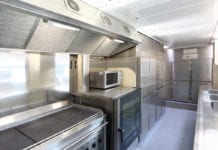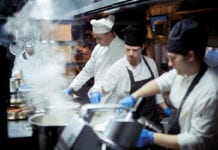Ignoring food temperatures could cause trouble
Food hygiene and safety is something no business can afford to get wrong.
Few things will damage an outlet’s reputation as severely as poor food hygiene, and anyone dealing with food has a responsibility – both legal and professional – to ensure it is stored, prepared and served in the safest way possible.
Maintaining the right temperature at all times is a vital part of this process, and so accurate, reliable thermometers are a must in any commercial kitchen.

Keith Warren, director of the Catering Equipment Suppliers Association (CESA), said temperature monitoring is “essential”.
“In order to comply with food safety legislation and meet Hazard Analysis Critical Control Points requirements (ie. to have a ‘hazard analysis’ plan in place), operators must keep a record of temperatures in all areas where food is stored, handled or cooked,” said Warren.
This includes monitoring the temperatures in all fridges, freezers, chillers and cold stores where food will be kept, as well as temperatures throughout the cooking process.
Warren stressed that this level of control is not only essential for complying with legislation, it can also provide real benefits to a business.
“Monitoring food temperatures from farm to plate allows businesses greater control of quality and cost, as the knowledge can reduce food wastage,” he said.
“In the event of a food safety incident, temperature records are a vital component in understanding what went wrong and how not to repeat it.”
As with any piece of kit, it’s important to purchase thermometers that are suited to an outlet’s particular needs.
Tim Strutt, UK sales manager for ETI, a manufacturer of commercial thermometers, said a conversation with suppliers is the best starting point.
“The supplier should be able to offer a number of different instruments depending on the nature of your application,” said Strutt.
“This is the one most important aspect of purchasing a thermometer – matching the application and the instrument.”
Licensees were also advised to research the best thermometers online before committing to purchase.
And although the products themselves should be straightforward to operate, staff knowledge on the correct temperature range for food at each stage is vital, said Strutt.
“Although a thermometer is basic in operation, the need for knowledge regarding temperature parameters is essential,” he said.
“These will be set within an approved HACCP procedure and there should be ‘target’ temperatures and ‘acceptable tolerances’ which should be understood by the user.
“There should also be an understanding of possible faults or causes of inaccuracies, and knowledge of how these issues can be seen and solved.”























